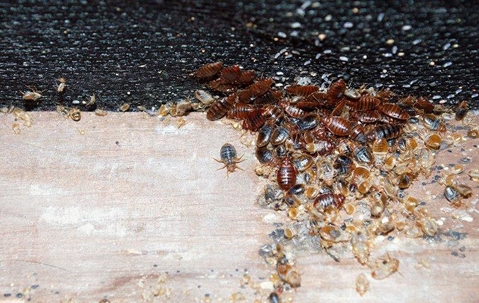Amazing Bed Bug Exterminator Treatment in Houston: Top Quality and Reliability
Amazing Bed Bug Exterminator Treatment in Houston: Top Quality and Reliability
Blog Article
Effective Bug Control Measures to Shield Your Yard and Plants
In the realm of horticulture, the consistency of a well-tended yard can typically be interfered with by unwanted pests that intimidate the health and vitality of plants. As gardeners make every effort to maintain a flourishing exterior area, the difficulty of bug control becomes a critical facet of their horticultural undertakings. Implementing effective parasite control measures not just safeguards the yard's visual charm but also plays a crucial function in protecting the plants' health. By exploring a series of methods that include all-natural repellents, beneficial insects, friend planting, DIY services, and environmentally-friendly chemicals, garden enthusiasts can navigate the detailed world of bug administration with accuracy and care.
All-natural Insect Repellents

An additional efficient natural insect repellent is diatomaceous earth, a fine-grained compound made from fossilized water organisms. Diatomaceous planet works by literally hurting pests with its abrasive texture, making it a superb option for regulating insects like slugs, beetles, and caterpillars. Furthermore, growing friend plants like marigolds, lavender, or basil can aid repel bugs due to their strong scents or all-natural chemical compounds.
Beneficial Insects for Insect Control

One more useful pest is the parasitic wasp, which lays its eggs inside bug insects, ultimately eliminating them. Ground beetles are excellent for controlling caterpillars, snails, and slugs. Hoverflies, typically incorrect for due to their similar appearance, eat aphids, thrips, and caterpillars.
To bring in valuable insects to your garden, you can plant a diverse variety of flowering plants, such as dill, fennel, and yarrow, which supply nectar and pollen for grown-up insects. Additionally, prevent using broad-spectrum pesticides that can damage both harmful and useful pests. By creating an inviting setting for these helpful insects, you can minimize the need for chemical pesticides and advertise a much healthier, a lot more well balanced garden environment.
Buddy Planting Approaches
When intending to improve the performance of advantageous pests in your yard for all-natural parasite control, thinking about companion planting techniques can official source even more optimize the environment balance. Buddy planting includes tactically putting particular plants beside each other to maximize their mutual benefits, such as discouraging bugs, attracting valuable pests, or enhancing vitamins and mineral uptake - bed bug exterminator houston near me. One popular example is growing marigolds along with tomatoes to drive away nematodes and other damaging bugs while additionally bring in pollinators
Growing catch crops like nasturtiums can draw away pests away from your primary crops, serving as sacrificial plants that protect your valuable produce. By executing friend growing strategies, you can create a varied and harmonious yard environment that naturally regulates parasites while advertising plant health and performance.
Do It Yourself Parasite Control Solutions
To effectively manage insects in your yard, carrying out do-it-yourself pest control services can be a cost-effective and eco friendly approach. One typical DIY parasite control option is creating home made insecticidal soaps by blending mild soap with water to regulate soft-bodied pests like aphids, termites, and whiteflies. In addition, presenting useful insects such as ladybugs, lacewings, and aggressive wasps can aid normally control parasite populaces in your yard. Establishing physical barriers like row covers or netting can additionally protect against parasites like caterpillars from harming your plants.
Friend planting specific herbs and flowers like marigolds, basil, and lavender can assist ward off parasites and draw in beneficial bugs. By incorporating these DIY pest control options right into your horticulture regimen, you can secure your garden and plants without depending on severe chemicals.
Environmentally-Friendly Pesticides

An additional reliable alternative is diatomaceous planet, an all-natural material made from fossilized marine microorganisms, which can be sprinkled around plants to manage slugs, snails, and other creeping bugs. In addition, insecticidal soaps and oils stemmed from plant-based resources are beneficial for regulating soft-bodied insects like aphids, termites, and whiteflies.
Conclusion
Finally, effective parasite control measures such as all-natural repellents, beneficial pests, companion planting methods, DIY options, and environmentally-friendly pesticides are vital for safeguarding your yard and plants. By applying these approaches, you can avoid damages brought on by insects and keep a healthy and growing garden community. It is very important to think about the lasting impact of utilizing chemicals and choose even more lasting and eco-friendly options to make sure the wellness and well-being of your plants and the setting.
Report this page